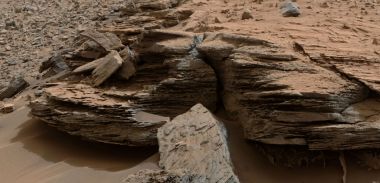Mars Rover discoveries don't point to ancient life on the red planet, say scientists

The Mars Rover Curiosity mission team said that the sedimentary structures of an ancient lakebed on the red planet are more likely results of natural erosion rather than fossilisation with biological origins, say Mars Rover scientists.
This conclusion contradicts an earlier study published by an outside geobiologist.
There have been conflicting viewpoints over evidence from Gillespie Lake, a dried-up lakebed in Mars that is believed to have been flooded seasonally billions of years ago.
Last month, Astrobiology published geobiologist Nora Noffke's study in which she noted similarities between the sedimentary structures in Gillespie Lake and similar microbially-induced structures on our own planet. Noffke suggested that this could be evidence of ancient life on the Red Planet.
In conducting the study, the geobiologist said she spent several weeks looking at the images and comparing them with pictures taken from sites all around the world, including Mellum Island in Germany, Portsmouth Island in the USA, and Carbla Point in Western Australia.
Others in the science world aren't convinced though. Speaking to Space.com, mission project scientist Ashwin Vasavada said that they took a look at the images that Noffke had examined for evidence of biological processes, but concluded that they "didn't see anything that can't be explained by natural processes of transporting that sand in water, and the nature of the rocks suggested that it was just fluvial sandstone."
"It came down to nothing exceptional, from our point of view, that wasn't just a consequence of erosion of this sandstone," he told Space.com.
Vasavada, however, commended Noffke nonetheless for her work and said that they welcome outside opinions in studying the results of the mission.
Noffke herself conceded that the hypothesis will require further study. "All I can say is, here's my hypothesis and here's all the evidence that I have," she wrote. "Further evidence must be provided to verify this hypothesis."











